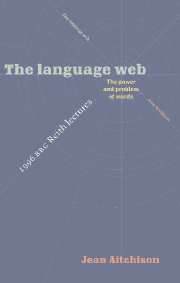2 - A web of deceit
The origin of language
Published online by Cambridge University Press: 05 June 2012
Summary
Some have held that language was revealed to man by supernatural interference; others, that he spoke naturally and instinctively as a bird sings; others, that language was contrived artificially by men who settled in conclave what arbitrary meaning each sound should bear; others, that the roots of language were sounds having an inherent suitability to express certain ideas, and so on. But… like the stories of strange monsters dwelling in the outer regions of the world, they may place themselves on an equal ground of assertion until the time when real knowledge shall come to divide the true from the false.
Edward B. Tylor ‘On the origin of language’ (1866)For centuries, ideas about language origin have frothed up like soap bubbles, then burst into nothing. Over 2,000 years ago, the Egyptian king Psammetichus reportedly gave instructions for two new-born children to be brought up in total isolation by a shepherd in a lonely cottage. The king wanted to find out the words they would first utter, which he assumed would reveal the world's oldest race. Two years later, as the shepherd unlocked the cottage-door one day, the children ran up to him with outstretched hands, pronouncing the word bekos.
Psammetichus discovered with dismay that this was the Phrygian word for ‘bread’, and reluctantly concluded that the Phrygians predated the Egyptians. But according to John Webb, a seventeenth-century writer, Chinese was the original language of humankind.
- Type
- Chapter
- Information
- The Language WebThe Power and Problem of Words - The 1996 BBC Reith Lectures, pp. 21 - 40Publisher: Cambridge University PressPrint publication year: 1996



